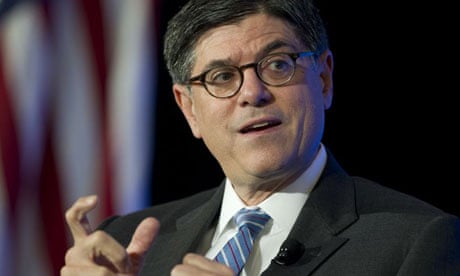Washington's increasingly heated battle over raising the US debt limit could all but wipe out the country's fragile recovery, economists warned on Friday.
The row over raising the government's $16.7tn borrowing limit is much more serious than the separate but politically linked tussles over the federal government's spending authority, which could trigged a government shutdown if they are not resolved by Monday.
While the shutdown would rattle the economy, economists said it would be nothing compared to a failure to raise the US's debt ceiling.
Treasury secretary Jack Lew warned Congress this week that unless it imminently approves an increase in the borrowing limit, the US government will be unable to meet its bills by 17 October. But Barack Obama is refusing to bow to Republican demands that he defund his landmark healthcare reforms in return for an agreement.
"Even if Congress can reach an agreement to renew the federal government's spending authority before it expires this Monday – which is looking increasingly unlikely – there's a much more serious battle brewing over the push to raise the debt ceiling before the Treasury runs out of money sometime shortly after 17 October," Capital Economics pair Paul Ashworth and Paul Dales wrote to clients Friday.
"We have no idea exactly how this standoff will be resolved, and even less of an idea exactly when any agreement might be reached. But, at this stage, we would be lying if we said we were confident of a positive outcome."
The Bureau of Labor Statistics will release its latest jobs report next Friday and important manufacturing data will also be released next week. In both cases, economists expect the figures to underline the strengthening US economy. But PNC bank senior macroeconomist Gus Faucher said a failure to raise the debt ceiling would "all but wipe out" that recovery.
"There will be an immediate drag on the economy, interest rates will rise for everyone. Social security, federal wages and contracts will not get paid. It would be disastrous," he said.
"The economy would basically stall."
The chances of a shutdown appeared roughly 50-50 on Friday morning as the Senate prepared to send the budget legislation back to the House of Representatives without the controversial clause that would defund Obamacare.
A vote was due on a Senate procedural measure known as cloture, which will provide a key test of Republican support for a protracted fight.
In theory, Republicans have enough senators to block the cloture motion, which requires 60 votes to pass, but most GOP moderates have already declared they will not obstruct passage any further.
This will allow Democrats to hold a simple majority vote on an amendment taking out the healthcare clause and stage a further vote on the revised bill later on Friday afternoon.
House leaders then have until Monday night to vote in favour of the revised bill, known as a continuing resolution, or force a government shutdown by sending the it back to the Senate again with fresh demands that are unlikely to be met in time.
It was still unclear on Friday morning how Republicans in the House will react, although they now have slightly more time to debate their response after a late-night deal to speed up the Senate timetable.
Mark Zandi, the chief economist at Moody's Analytics and a former adviser to Republican presidential hopeful John McCain, testified in Congress this week that failure to reach an agreement would trigger "a severe recession".
He told the joint economic committee: "If you don't do it in time, confidence will evaporate, consumer confidence will sharply decline. Businesses will stop hiring, consumers will stop spending, the stock market will fall significantly in value, borrowing costs for businesses and households will rise."
In a letter released by the Treasury Department on Wednesday, Lew said that on 17 October, "Treasury would have only approximately $30bn to meet our country's commitments".
He said the sum fell far short of the $60bn the US needs on some days to meet its obligations.
"If we have insufficient cash on hand, it would be impossible for the United States of America to meet all of its obligations – for the first time in our history," said Lew.







Comments (…)
Sign in or create your Guardian account to join the discussion